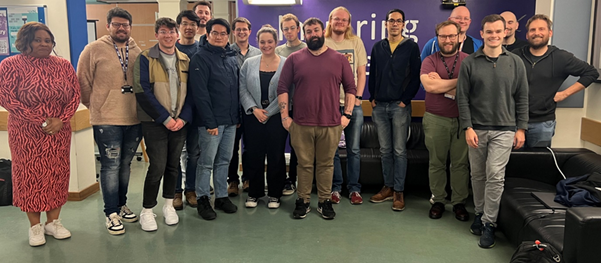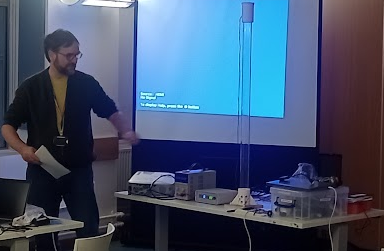Events#
Up Coming#
We are running two Hackathons jointly supported by the RSC and AIChemy
Liverpool AIChemy Hackathon#
Tuesday 17th - Wednesday 18th Feburary at University of Liverpool. Booking is here
Strathcylde AIChemy Hackathon#
Wednesday 18th March at the University of Strathclyde. Booking is here
Previous#
UCL Chemistry Hackathon 1#
On Thursday the 7th and Friday the 8th we held the first UCL Chemistry and PSDI Hackathon. Supported by PSDI and the Worshipful Company of Scientific Insturment Makers and the UCL teaching fund. 16 people from across the UK attended, with interest from others internationally. The hackers were from a range of academic levels, including Post Graduates, Research Fellows and technical positions. The aim of the Hackathon was for everyone to learn how to record information from sensors linked to Raspberry Pi microprocessors and log that information. The first step was for everyone to work through a set of online tutorials and guides that we have developed (https://inator-project.org/inator_project/intro.html). A variety of sensors and logging devices were made available. Such as VOC sensors, temperature probes and CO2 sensors. For logging there were SD cards and a set of nodeRED servers running on Raspberry Pis.

The Hackers were encouraged to be hands on and experimental. Trying to get a feel for the limitations and abilities of the sensors they had available. With one Hacker developing a website dashboard for the data from their sensors and another a electronics noughts and crosses board. During the first day Prof Christoph Salzmann gave a live demonstration of what was possible using microcontrollers with his PID controlled ping-pong fan. A device that used feedback from sensors to control the height of a ball in a tube. This modelled the type of device many of the hackers would like to make, capable of measuring conditions but also controlling them.

The event was run in a friendly and relaxed way, with refreshments freely available throughout all the sessions. Feedback from in person and a follow up questionnaire was universally positive. With everyone enjoying the experience. A sample response: “The hands-on nature of the event was really excellent, and the discussions with people were super useful.”
UCL Chemistry Hackathon 2#
How to make Lab Environments FAIR?#
On 22nd and 23rd of July we held the second UCL Chemistry Hackathon. Based on the following challenge:
Challenge: How to take measurements of environmental and apparatus conditions and link them with the experimental measurements performed on a sample? Using microprocessors and sensors it is relatively easy to log the conditions in a laboratory day to day and second to second. What is less easy is how to connect this logged data to measurements performed in that laboratory. In this hackathon you will have the opportunity to find how to connect logged data to other repositories such as an Electronic Research Notebook.
The event was well attended with a range of abilities, ages and levels.
Representatives from RSpace were on hand to discuss what people wanted to attempt and how to interact with their API